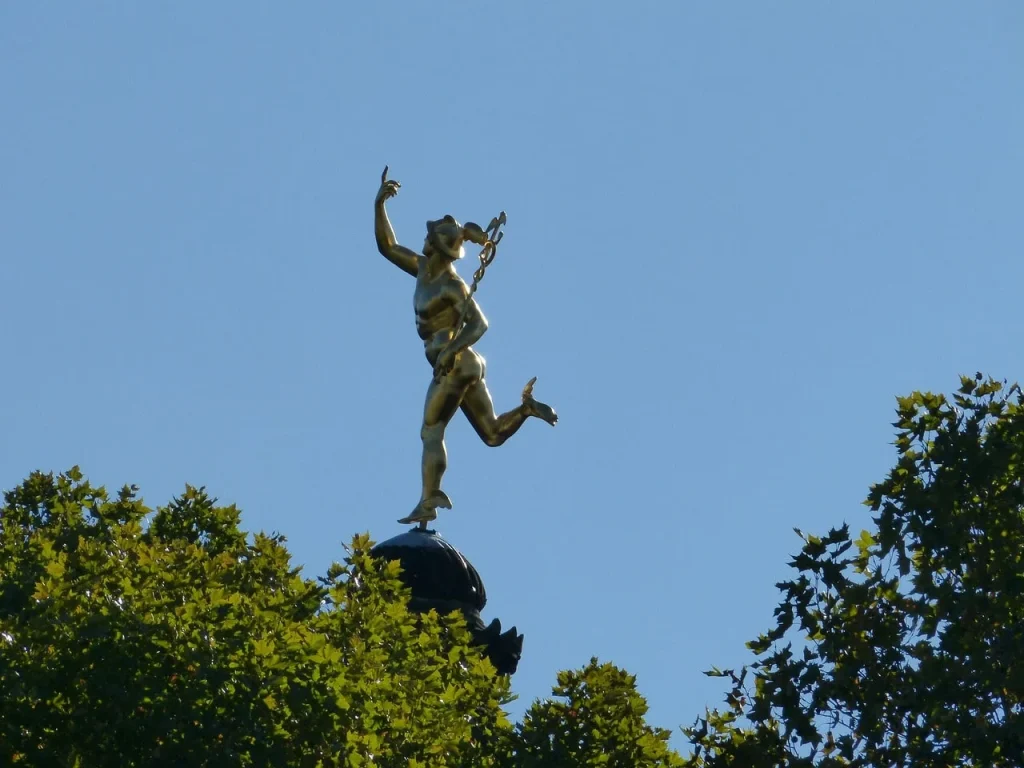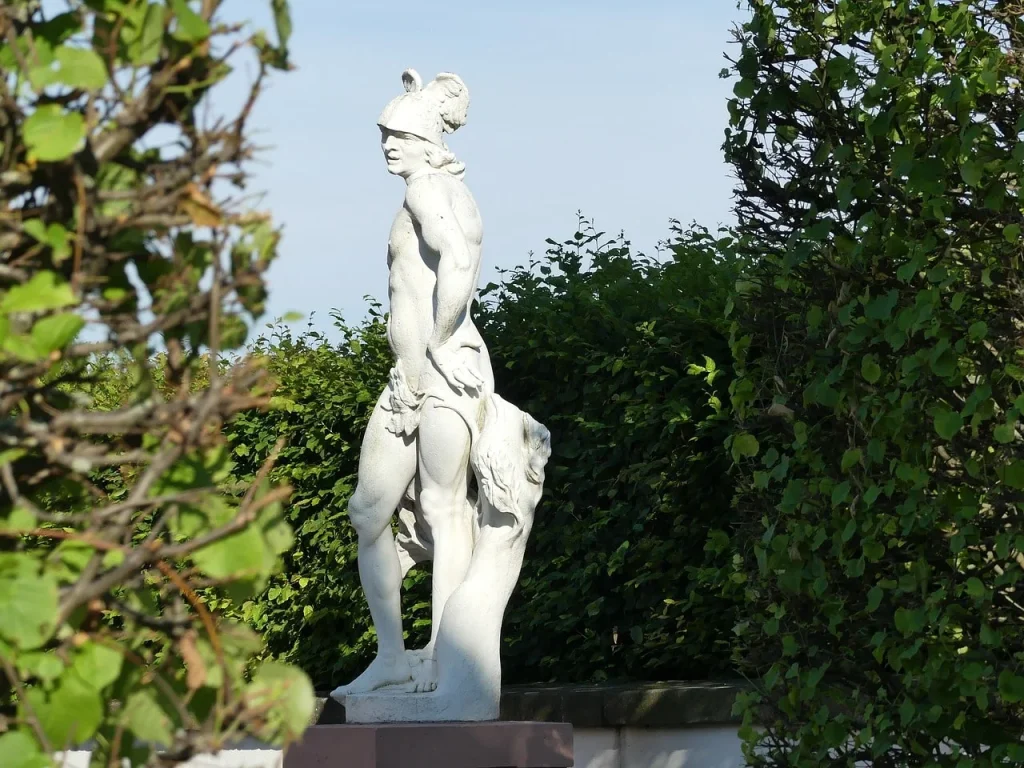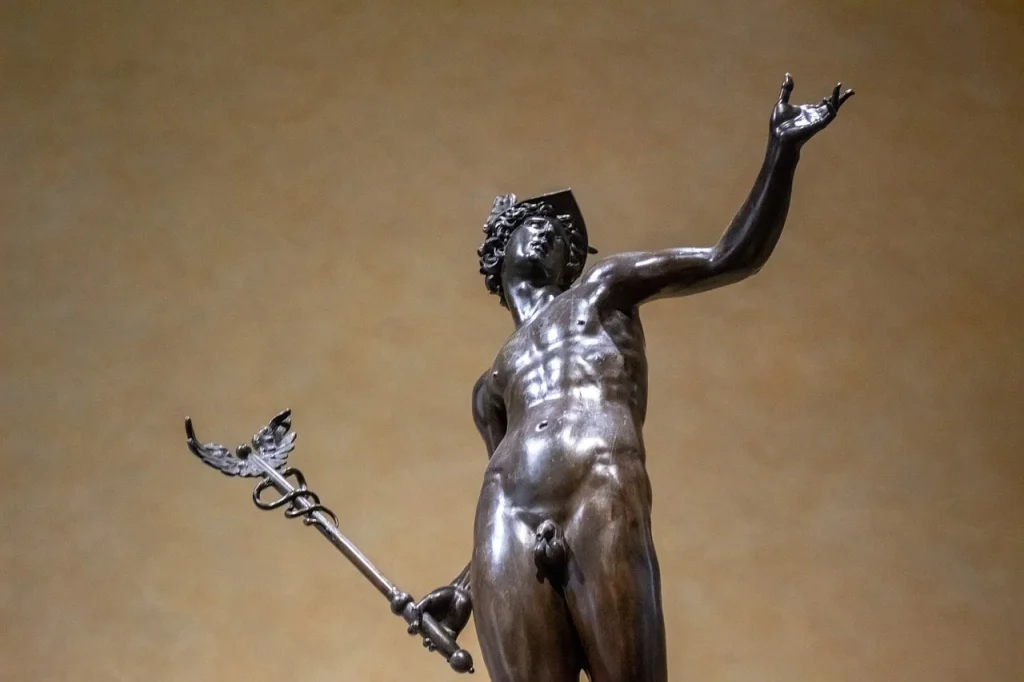Who is Hermes, and why is he such a significant figure in Greek mythology? Today, we explore the details of this god’s life through some fun and surprising facts.
Known for his swift movements and as a liaison between the mortal world and the divine, Hermes has captivated people’s imaginations for centuries. Join us as we uncover the roles, symbols, and stories that define Hermes, bringing ancient myths to life right before your eyes.
Hermes has wings to fly; which signify that you must not creep in the performance of your office, but fly round the world.
Sir Francis Bacon
Hermes Facts
Before we start our journey in the world of Hermes, prepare to test your knowledge with a quiz at the end of this article. Read carefully to prove you’re an expert on this fascinating deity.
- The god was born in a cave on Mount Cyllene in Arcadia.
- Zeus and Maia, a daughter of Atlas, are his parents.
- He created the lyre from a tortoise shell on the day of his birth.
- The sandals, often associated with him, were winged, aiding his swift movements.
- He invented fire sticks, which were crucial for human civilization.
- Ancient texts sometimes describe him as a trickster who outwitted other gods for fun.
- Apollo was once deceived by him over a stolen herd of cattle.
- To appease Apollo after the theft, he gifted him the lyre he created.
- He serves as a psychopomp, guiding souls to the afterlife.
- His staff, the Caduceus, is often mistakenly used as a symbol of medicine.
- Contrary to popular belief, the correct medical symbol is the rod of Asclepius.
- He was one of the only gods capable of freely crossing the boundaries between the divine and mortal worlds.
- In mythology, he is depicted as a mediator and messenger who helped to resolve conflicts.

- He wore a petasos, a hat with a wide brim, emblematic of travelers and adventurers.
- Hermai, stone pillars with his face and phallic symbol, were common road markers in ancient Greece.
- His Roman equivalent is Mercury, who also embodies trade, travel, and eloquence.
- He occasionally served as a foster father to other gods‘ children, including Dionysus.
- Thieves and liars worshipped him, praying for his protection and blessing.
- His cleverness and cunning are often shown in myths as being used for noble causes.
- One of his sons, Pan, is a god associated with nature and wilderness.
- He invented the alphabet, according to some Greek myths.
- The ancient Greeks celebrated festivals in his honor, called Hermeneia.
- He is often depicted in art and sculptures as youthful and athletic.
- Hermes never married, but he had many lovers and children.
- He played a crucial role in the myth of Perseus, lending him the cap of invisibility.
- Some cults believed that he had the power to bring good luck and fortune.
- In literature, he is often shown as a champion of human ingenuity and resourcefulness.
- Astronomers named a planetoid “69230 Hermes” in his honor.

- He is also considered the god of boundaries, both literal and figurative.
- His name is derived from the Greek word for “heap of stones,” reflecting an ancient custom of marking paths.
- In the Odyssey, he helps Odysseus with a magic herb to ward off Circe’s spell.
- Scholars often debate his role as a god of commerce due to his ties to fairness and trade.
- He was believed to have a humorous and playful side, often getting involved in the affairs of other gods.
- Hermeticism, a set of philosophical and religious beliefs, is partially named after him.
- The Greeks considered him the inventor of wrestling and other sports.
- He also played a role in the tale of Pandora, being the one who bestowed her with a deceitful heart and a lying tongue.
- Though primarily a benign deity, he wasn’t above petty theft and trickery for amusement or to prove a point.
- His versatility as a god is evident from his large and varied number of roles in myths.

- He communicated Zeus’s orders to other gods, but he also had an independent streak.
- As a symbol of trade, small herms often stood outside Greek businesses for good luck.
- His worshippers included not only travelers and merchants but also orators and poets seeking eloquence.
- In some stories, he is credited with inventing many types of racing and the sport of boxing.
- Despite his many roles, he is consistently shown as loyal to Zeus, his father and king of the gods.
- His agility and cleverness were often called upon during the gods’ skirmishes or when navigating tricky situations.
- Legends say he was capable of moving between worlds in mere moments, a testament to his speed and magical abilities.
- His sacred animals include the tortoise, the ram, and the hawk, reflecting various aspects of his personality and myth.
- Unlike many Olympian gods, he maintained a diplomatic stance, avoiding major conflicts and battles.
- Many ancient plays humorously portray his mischievous nature and involvement in human affairs.
- Despite his numerous offspring and liaisons, detailed myths about his children are comparatively scarce.
- He also gifted Apollo the golden staff that later became synonymous with the god’s own image.
Hermes Myths

Having covered the facts, it’s time to tackle the myths. We’ll sort through the tales to uncover what is true and what is merely legend.
- Hermes Was Merely a Messenger God
Although he is widely recognized as the messenger of the gods, his role was far more multifaceted. He was also revered as the god of trade, wealth, luck, fertility, animal husbandry, sleep, language, thieves, and travel. - Hermes Had No Significant Religious Influence
Contrary to this belief, he was deeply venerated across Greece. He was often invoked for protection on journeys and his statues, known as herms, were common landmarks that offered travelers good fortune and guidance. - Hermes Always Acted Ethically
This is not entirely accurate. In mythology, he was known for his cunning and shrewdness. For instance, on the day he was born, he famously stole the cattle of Apollo, showcasing his mischievous nature. - Hermes and Mercury Are Identical
While Hermes and Mercury share similarities as they are both messenger gods in Greek and Roman mythology respectively, cultural nuances influence their attributes and stories. Each deity is adapted to fit their own mythology’s themes and values. - Hermes Created the Lyre Out of Spite
It is often misunderstood that he crafted the lyre to spite Apollo. In truth, the lyre was created from a tortoise shell as a peace offering to Apollo after stealing his cattle, leading to a lasting bond between the two gods.
No products found.
Hermes Quotes

Let’s continue with some quotes. Feel free to share yours in the comments so I can add them to the list as well.
Hermes, the herald of the Olympian gods, is the god of travelers, shepherds, athletes, merchants, thieves, and orators.
Rick Riordan
Rick Riordan highlights the diverse roles Hermes plays in Greek mythology, showcasing his multifaceted nature.
With thieves I consort, with the Vain I waste time, but with this messenger god I rhyme.
Homer
Homer creatively aligns himself with Hermes, emphasizing the god’s association with language and poetry alongside more mischievous elements.
Hermes, who is also called Mercury, is a god of transitions and boundaries, moving freely between the worlds of the mortal and divine.
Carl Jung
Carl Jung points out Hermes’ role as a mediator between realms, symbolizing his importance in psychoanalysis and mythology for bridging various aspects of experience.
He wore the guise of a kindly old man; guide and guardian, the god of travelers, the merry Hermes.
Hesiod
Hesiod captures the benevolent and protective qualities of Hermes, portraying him as a patron of those far from home.
Hermes is the god of all who live by their wits, of all adventurers, and of all thieves.
Robert Graves
Robert Graves encapsulates Hermes’ appeal to those who rely on cleverness and cunning, highlighting his complex and intriguing character traits.
Hermes FAQ

One section before the quiz, it’s the FAQ section. Read carefully if you want to score a perfect ten.
- Can Hermes fly?
Yes, he is known to be capable of flying, primarily thanks to his winged sandals called Talaria. - What are some symbols associated with Hermes?
Key symbols of Hermes include the caduceus (a staff entwined with two serpents), a traveler’s cap, and winged sandals. - Does Hermes have any siblings?
Yes, he has numerous half-siblings, including Apollo, Artemis, and Athena, as they share the same father, Zeus. - What are some famous myths involving Hermes?
One famous myth is when he stole his brother Apollo’s cattle as a newborn. Another is his role as the guide of souls to the underworld. - How is Hermes depicted in art?
He is often depicted as a young man wearing a traveler’s cap and sandals, carrying a caduceus or a purse, symbolizing his role as the divine herald and protector of travelers and merchants.
No products found.
Hermes Trivia

Get ready to fly with the wings of knowledge in our Hermes trivia! Remember, if you don’t get any right, you might find your emails redirected to Olympus instead of their intended recipients!
Conclusion
We’ve taken a closer look at the myriad roles Hermes plays in Greek mythology, from a messenger and trickster to a guide of souls.
His versatility and vibrant narratives not only entertain but also offer insight into the complexities of life and the human spirit. As we conclude, remember that Hermes’ stories carry timeless lessons in cunning and communication. Till next time, stay curious and explore more. Cheers.
3 Sources Used For This ArticleHermes: Greek God Of Herds And Trade – Mystery In History
Hermes – God of All Trades, Guide of the Souls – Olympioi


